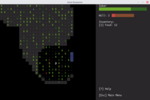From Eternity to Here by Sean Carroll
book, review, science
This review was originally posted at Goodreads and imported here later with next to no spell/grammar checking.
4/5 stars
Having read this book after The Big Picture, it is clear this is the older of the two. Carroll had not yet refined his language and the book is much dryer and demanding. You will want to pause, think and stretch your imagination.
It is absolutely worth it, though.
The theme of From Eternity to Here is entropy and the arrow of time. Why in the face of laws of physics that work the same way from the past to the future and vice versa, we clearly see the universe has a preferred direction?
Throughout the book, we encounter thermodynamics, statistical approaches to entropy (it doesn’t always increase) and then dive straight into the general relativity and quantum mechanics as if we were not taught these are impossible to understand and contemplate.
And that’s what I most liked about this book: it’s not afraid to dig into the hard topics. And when it does, it takes them seriously. Yes, there are analogies and simplifications so the reader has a chance of understanding what’s going on. But it goes much closer to the meat of the matter. Most books I’ve read tend to outline these topics, present a few weird examples and be done with it. From Eternity to Here only stops where the next step would have to involve the actual math.
This makes it a demanding book to read. You have to give it your full attention. Trying to juggle various light cones in my head was not the easiest past-time activity, but it was absolutely worth it.
I have a much better understanding of cosmology and some of the nuances that get lost in the more accessible explanations. I finally get why is the conservation of information important and how black holes seem to cause trouble there and what the bloody hell does the term "information" mean in this context. I have a better understanding of how you can describe entropy more formally than "the amount of disorderliness on the macroscopic level" (when Sean dropped Kolmogorov complexity — a term I know from computer science, my mind was utterly blown).
This is a science book for people who feel they’ve outgrown the watered-down popular explanations, but they’re not comfortable getting a physics Ph.D. to learn more.
